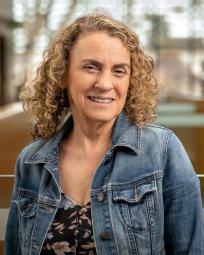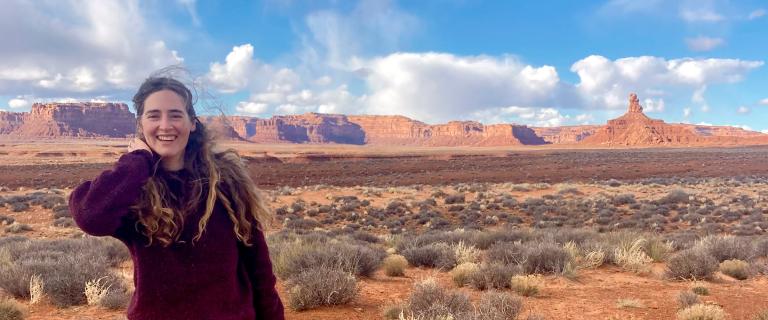


Jane Jacoby grew up in New York City in a forest. Well, it seemed like a forest to her. It was a clump of trees in Central Park near her home. She spent a ton of time there, climbing the tree and enjoying the nature within the cityscape. Now Jacoby ’24 MF/ JD will be using her combined degree in law and forestry to protect natural areas with a goal of putting climate justice front and center in her efforts.
“I’ve always been surprised when people ask how conservation and land management are tied to environmental justice concerns when they’ve always been intricately tied,” Jacoby said.
Her commitment to conservation solidified after she participated in a program at The Mountain School in Vermont and studied the works of terrestrial ecologist Tom Wessels.
“It helped me understand my connection to the landscape and the profound impacts of people on the land and on forests,” she said.
Environmental justice became a primary interest after Jacoby witnessed the impact of Hurricane Sandy on communities in her home state and later while working as an AmeriCorps volunteer in Texas.
“I had already seen the impact of climate change and climate injustice in how inequitable the outcomes of Sandy were. But when I got sent to Texas in 2017 to work on disaster relief after Hurricane Harvey, it took that understanding to another level. It was so clear that wealth and identity determined outcomes. The people who needed help the most weren’t getting it, and it made me mad,” she recalled.
I think there is a perception that land management and environmental justice goals are wholly separate spheres and that there are going to be tensions with each. That’s definitely not the case."
Jacoby says she learned about innovative ways to approach environmental issues through the law while a teaching fellow at the Environmental Protection Clinic at Yale Law School. She also was co-leader of the Yale Environmental Law Association, worked with the Access to Law School program at the Yale Law and Racial Justice Center, and participated in the Yale Center for Environmental Justice’s Tribal Resources and Sovereignty Clinic.
“I think there is a perception that land management and environmental justice goals are wholly separate spheres and that there are going to be tensions with each. That’s definitely not the case. The Jemez principles of environmental justice call for recognizing the autonomy of both the earth and human communities. You can’t treat the two as separate systems,” she said.
Douglas Kysar, Joseph M. Field ’55 Professor of Law, credits Jacoby with helping to redesign the Environmental Protection Clinic’s seminar curriculum to address environmental justice issues more fully.
“She was pivotal in helping us overhaul our curriculum to include a lot more environmental justice content, but also in terms of improving our pedagogy. We held internal anti-racist pedagogy trainings for the teaching team. A lot of that was at Jane's urging and with Jane's guidance. She had a way of inspiring us to be better,” Kysar said.
To round out her field experience, Jacoby interned as a summer law clerk at the Southern Environmental Law Center (SELC) in 2023 and as a law clerk in 2021 at the natural resources division of the Department of Justice Environment (DOJ).
“I really got a sense of how big and complicated and multi-faceted the federal government is and the ways different agencies interact with each other,” she said about her work at DOJ. “I had perceived the federal government as a sort of monolithic single operator and it was eye opening to see tensions that can exist within the government and how dynamic it is because there are agencies with such different mandates.”
Jacoby’s recent work has focused on the barriers that keep people from having a voice in environmental policy — an area known as environmental democracy and environmental constitutionalism — and creating new pathways to bridge this gap.
“There are powerful tools that already exist, but I came out of this experience recognizing how deeply flawed those tools are to deal with some of our most extreme challenges and seeing a need to imagine what better ones might look like,” she said.
After graduation, Jacoby is heading back to New York City to work as a Yale Fellow at the National Resources Defense Council. She will return to campus in a year to run the Yale Environmental Protection Clinic as part of the second year of her fellowship.
“Jane is one of the most honorable and caring people I know who is going to go on to do great things for our forest world and the people who live in them,” says Mark Ashton, Morris K. Jesup Professor of Silviculture and Forest Ecology and senior associate dean of The Forest School.
Jacoby said she hopes to bring the energy and commitment she shared with the student community at YSE into her new positions.
“Seeing the passion of my classmates and their commitment to the causes that they really believe in and seeing the ways in which they really will put themselves on the line to fight for the things that they care about inspires me to do the same. It's beautiful and hopeful to have a community that pushes people to do better,” she said.
